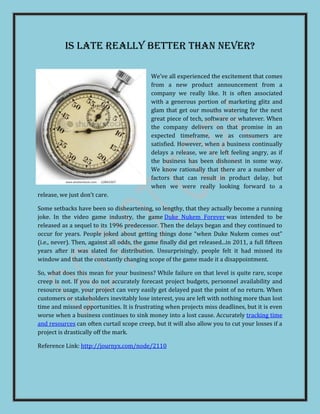IS LATE REALLY BETTER THAN NEVER?
- 1. IS LATE REALLY BETTER THAN NEVER? WeŌĆÖve all experienced the excitement that comes from a new product announcement from a company we really like. It is often associated with a generous portion of marketing glitz and glam that get our mouths watering for the next great piece of tech, software or whatever. When the company delivers on that promise in an expected timeframe, we as consumers are satisfied. However, when a business continually delays a release, we are left feeling angry, as if the business has been dishonest in some way. We know rationally that there are a number of factors that can result in product delay, but when we were really looking forward to a release, we just donŌĆÖt care. Some setbacks have been so disheartening, so lengthy, that they actually become a running joke. In the video game industry, the game Duke Nukem Forever was intended to be released as a sequel to its 1996 predecessor. Then the delays began and they continued to occur for years. People joked about getting things done ŌĆ£when Duke Nukem comes outŌĆØ (i.e., never). Then, against all odds, the game finally did get released...in 2011, a full fifteen years after it was slated for distribution. Unsurprisingly, people felt it had missed its window and that the constantly changing scope of the game made it a disappointment. So, what does this mean for your business? While failure on that level is quite rare, scope creep is not. If you do not accurately forecast project budgets, personnel availability and resource usage, your project can very easily get delayed past the point of no return. When customers or stakeholders inevitably lose interest, you are left with nothing more than lost time and missed opportunities. It is frustrating when projects miss deadlines, but it is even worse when a business continues to sink money into a lost cause. Accurately tracking time and resources can often curtail scope creep, but it will also allow you to cut your losses if a project is drastically off the mark. Reference Link: http://journyx.com/node/2110
